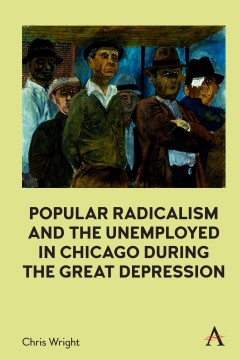Popular Radicalism and the Unemployed in Chicago during the Great Depression
By Chris Wright
- About This Book
- Reviews
- Author Information
- Series
- Table of Contents
- Links
- Podcasts
About This Book
In a time when mass joblessness and precarious employment are becoming issues of national concern, it is useful to reconsider the experiences of the unemployed in an earlier period of economic hardship, the Great Depression. How did they survive, and how did they fight against inhumane government policies? Americans are often thought to be a very conservative and individualistic people, but the collective struggles of the supposedly “meek” and “atomized” unemployed in the 1930s belie that stereotype.
Focusing on the bellwether city of Chicago, this book reevaluates those struggles, revealing the kernel of political radicalism and class resistance in practices that are usually thought of as apolitical and un-ideological. From communal sharing to “eviction riots,” from Unemployed Councils to the nationwide movement behind the remarkable Workers’ Unemployment Insurance Bill, millions of people fought to end the reign of capitalist values and usher in a new, more socialistic society. While they failed in their maximal goal of abolishing economic insecurity and the disproportionate power of the rich, they did wrest an incipient welfare state from the ruling class. Today, their legacy is their resilience, their resourcefulness, and their proof that the unemployed can organize themselves to renew the struggle for a more just world.
Reviews
“In Popular Radicalism and the Unemployed, Chris Wright uncovers a deep vein of activism during the Great Depression. By focusing mostly on industrial workers, scholars have missed layers of protest expressed not just in words but in deeds by the era’s most deprived, the chronically unemployed. Wright shows us a web of activities, often centered in unions and churches. The jobless and homeless held onto a strong sense of mutuality, and they even organized sit-ins, demonstrations, hunger marches, all with clearly articulated policy goals. Popular Radicalism and the Unemployed urges us to rethink the alleged inertia of society’s most oppressed then and now, and thereby to rethink social class.”—Elliot J. Gorn, Professor, Joseph A. Gagliano Chair in American Urban History, Loyola University Chicago, USA.
“In this timely work that examines mass unemployment in 1930s Chicago, Chris Wright tells a powerful story of the active resistance of unemployed people against dehumanizing, capitalist forces. He demonstrates the power of community and solidarity among Chicago’s unemployed and argues for the radical potential of all humans’ desire for dignity and recognition.” — Randi Storch, Distinguished Teaching Professor, SUNY Cortland, USA.
“Popular Radicalism and the Unemployed in Chicago during the Great Depression offers a superb understanding of how the unemployed experienced life throughout the Great Depression. Christopher Wright’s extensive archival research provides insights that challenge popular assumptions of life during the Depression. It is a wonderful addition to the literature focused on American life at the grass root level throughout the 1930s.” — Ryan S. Pettengill, Professor of History, Collin College and the author of Communists and Community: Activism in Detroit’s Labor Movement, 1941–1956.
This book is best for those interested in understanding the human aspect of unemployment during the Depression as well as those seeking evidence that many whom the economic downturn negatively impacted were far from stoic in reaction to their circumstances — Choice
Author Information
Chris Wright is Adjunct Assistant Professor of History at the City University of New York. He is the author of Worker Cooperatives and Revolution: History and Possibilities in the United States (2014). His writing has appeared in the Washington Post, Dissent, Truthout, and other publications.
Series
Table of Contents
Acknowledgments; Introduction; Chapter One - Overview; Chapter Two - Hardship; Chapter Three - Coping; Chapter Four - Relief; Part I: “Shelter Men”, Chapter Five - Relief; Part II: Governments, Unions, and Churches, Chapter Six - Collective Action; Conclusion; Index
Links
Stay Updated
Information
Latest Tweets



